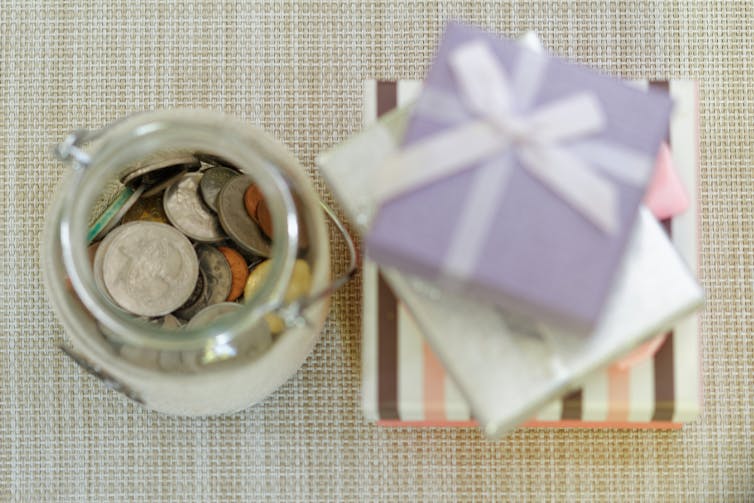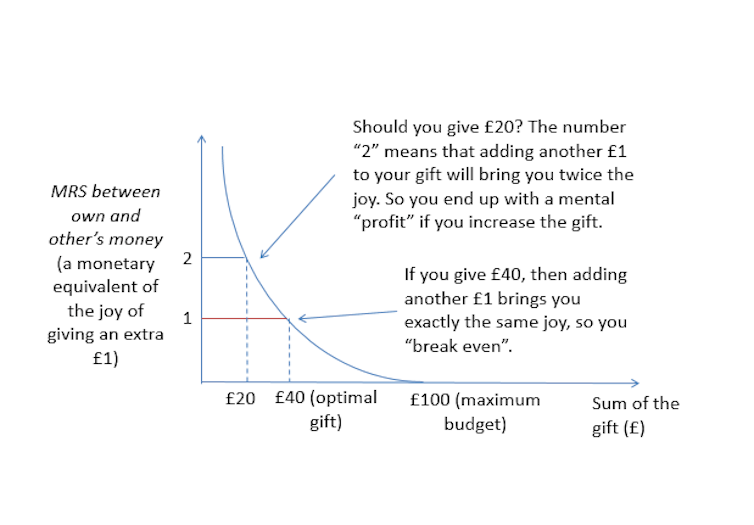Is £100 a generous enough wedding gift? Not according to one bride, who emailed her guest asking for a top up to their present of cash. The story prompted a lively discussion about how much one should spend on a present for newlyweds – and most people who left comments on the Guardian’s website felt that this should be a matter for the giver and that the recipient should have been grateful for what she received.
You can listen to more articles from The Conversation, narrated by Noa, here.
While this question is first and foremost a matter of etiquette, one can turn to economists for a more exact answer. After all, in the past economists have put price tags on such sacred things as a human life, being law abiding and even having a clear conscience.
Thanks to insights from psychology and neuroscience, economic modelling of human decision making is now very realistic. It goes well beyond a simple assumption that everyone prefers more money to less and instead takes account of such things as altruism, fairness, reciprocity and guilt.
So how exactly are these moral considerations modelled in economics? Simply put, a person is assumed to have an internal “exchange rate” between some other person’s money and their own money – what economists call a “marginal rate of substitution” which can be used to quantify a relative preference between any two goods. This rate depends on many things, such as the closeness of the two people’s relationship, as well as their relative financial standing (in the wedding present story, the guest had just inherited some money and speculated that maybe the bride and groom expected to benefit more as a result).
Because of the latter point, the exchange rate falls as you pass your money along to the other person. Cash needn’t change hands literally, the “passing along” of money can just be happening in your mind when you decide on the amount of a wedding gift. So, suppose you start with a sum of £30. This might sound a bit tight, so should you up it to £40? Maybe £50? You will stop considering larger sums when the “exchange rate” between the couple’s payoff and your own falls below 1. That is, until the point at which you would rather keep another pound than donate it to their honeymoon fund.
Maria Kozlovskaya, Author provided
The above example illustrates a basic economic model of “other-regarding considerations”. However, since we usually do not know this “exchange rate” between one’s own and the other person’s money, this abstract method is not very helpful when deciding on the appropriate sum of a wedding gift. Thankfully, economics also suggests two concrete factors behind one’s chosen amount of a gift: expectations and reciprocity.
Expectations and promises
A lot of human activity is driven by the desire to meet expectations – an observation which recently made its way into economic analysis. People feel bad if their actions violate a personal or social standard. From an economics standpoint, a person experiences guilt when they inflict a “payoff loss” on some other agent. A guest at a wedding will feel bad if their contribution falls short of the expected amount. Similarly, a three-figure cheque for a gift can make the couple uncomfortable, as a Guardian reader put it in a discussion: “I would feel incredibly awkward to receive an overly generous gift.”
How are expectations formed in the first place? One way to fix an expectation is to make a promise, either explicitly or a tacitly. Economic experiments show that a mere act of verbally agreeing to donate money to a common fund significantly increases subsequent contributions. This happens even when the communication is non-binding and the promise (and donation) is issued to a complete stranger via an impersonal computer interface.

Raihana Asral
A tacit promise (in a form of “warm wishes”) is what the newlywed couple were referring to in their now-infamous email: “We were surprised that your contribution didn’t seem to match the warmth of your good wishes on our big day.” So, if the guest had previously pledged to make the down payment on the couple’s first house, the bride and groom would have the right to feel upset (if not express it in writing). However, this doesn’t seem to be the case here, so the bride is just being downright rude, as most commentators agreed.
Gift exchange
Another way to determine the appropriate value of a wedding present comes from the economic theory of “gift exchange”. As is well known, most people reciprocate generosity in everyday life. More surprisingly, this behaviour is also common in economic scenarios. For example, many employees work overtime after receiving a salary bonus, even when their efforts are not directly observed by the boss. Some wedding guests use similar logic, when they gift “a sum close to the cost (they) think the couple will be paying to have me/us there”, as expressed by several commenters.
Whether or not this emerging “reciprocal” view of wedding gifts is now the done thing is not for economists to judge. But it has certainly contributed to the surging expense of weddings, which now cost an average of £30,111.
Credit: Source link




